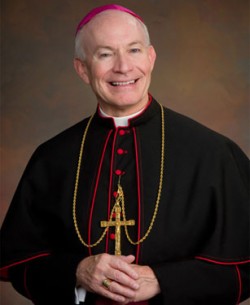Podcast: Play in new window | Download (Duration: 27:12 — 18.8MB) | Embed
Subscribe: Apple Podcasts | Spotify | Amazon Music | Android | Pandora | iHeartRadio | JioSaavn | Podchaser | Gaana | Podcast Index | Email | TuneIn | Deezer | Anghami | RSS | More

Episode 33 – What is the Kerygma – Why it Matters: An Exploration of Faith with Archbishop George Luca
Archbishop Lucas and Kris McGregor begin the discussion of the first announcement, more formally known as KERYGMA
From the APOSTOLIC EXHORTATION EVANGELII GAUDIUM OF THE HOLY FATHER FRANCIS
164. In catechesis too, we have rediscovered the fundamental role of the first announcement or kerygma, which needs to be the centre of all evangelizing activity and all efforts at Church renewal. The kerygma is trinitarian. The fire of the Spirit is given in the form of tongues and leads us to believe in Jesus Christ who, by his death and resurrection, reveals and communicates to us the Father’s infinite mercy. On the lips of the catechist the first proclamation must ring out over and over: “Jesus Christ loves you; he gave his life to save you; and now he is living at your side every day to enlighten, strengthen and free you.” This first proclamation is called “first” not because it exists at the beginning and can then be forgotten or replaced by other more important things. It is first in a qualitative sense because it is the principal proclamation, the one which we must hear again and again in different ways, the one which we must announce one way or another throughout the process of catechesis, at every level and moment.[126] For this reason too, “the priest – like every other member of the Church – ought to grow in awareness that he himself is continually in need of being evangelized”.[127]
165. We must not think that in catechesis the kerygma gives way to a supposedly more “solid” formation. Nothing is more solid, profound, secure, meaningful and wisdom-filled than that initial proclamation. All Christian formation consists of entering more deeply into the kerygma, which is reflected in and constantly illumines, the work of catechesis, thereby enabling us to understand more fully the significance of every subject which the latter treats. It is the message capable of responding to the desire for the infinite which abides in every human heart. The centrality of the kerygma calls for stressing those elements which are most needed today: it has to express God’s saving love which precedes any moral and religious obligation on our part; it should not impose the truth but appeal to freedom; it should be marked by joy, encouragement, liveliness and a harmonious balance which will not reduce preaching to a few doctrines which are at times more philosophical than evangelical. All this demands on the part of the evangelizer certain attitudes which foster openness to the message: approachability, readiness for dialogue, patience, a warmth and welcome which is non-judgmental.
For more episodes in this series visit the


